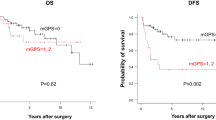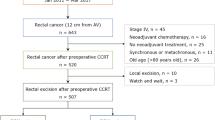Abstract
The prognostic value of several clinical and histopathological characteristics has been evaluated in patients with Dukes' B and C carcinoma of the rectum and the rectosigmoid. Data on 260 Dukes' B and 208 Dukes' C tumours entered into a prospective, randomized clinical trial of post-operative radiotherapy (50 Gy given with 2 Gy/fraction in an overall time of 7 weeks) were analyzed by means of the Cox proportional hazards model. The Dukes' stages B and C were analyzed in two separate multivariate analyses. In patients with Dukes' B tumours, a poor prognosis was associated with age above 60, perineural and venous invasion, tumour located less than 10 cm from the anal verge and elevated pre-operative carcinoembryonic antigen (CEA) (greater than 3.2 ng ml-1). In patients with Dukes' C tumours, perineural and venous invasion, tumour located less than 10 cm from the anal verge, and elevated pre-operative CEA were associated with a poor prognosis. In addition, a large tumour diameter had a strong, negative influence on the prognosis. Males seemed to have a poorer prognosis than females among the Dukes' C patients. Resection of neighbouring organs was also associated with a poor prognosis in this stage. Post-operative radiotherapy as administered in the present series had no significant influence on prognosis. Based on the derived prognostic models patients with a hazard of death above the median in each stage were selected. A separate analysis of the survival in these high risk patients showed no survival benefit from radiotherapy. The proportional hazards model may be a useful tool in selecting patients for more aggressive adjuvant treatment.
This is a preview of subscription content, access via your institution
Access options
Subscribe to this journal
Receive 24 print issues and online access
$259.00 per year
only $10.79 per issue
Buy this article
- Purchase on Springer Link
- Instant access to full article PDF
Prices may be subject to local taxes which are calculated during checkout
Similar content being viewed by others
Author information
Authors and Affiliations
Rights and permissions
About this article
Cite this article
Bentzen, S., Balslev, I., Pedersen, M. et al. A regression analysis of prognostic factors after resection of Dukes' B and C carcinoma of the rectum and rectosigmoid. Does post-operative radiotherapy change the prognosis?. Br J Cancer 58, 195–201 (1988). https://doi.org/10.1038/bjc.1988.192
Issue Date:
DOI: https://doi.org/10.1038/bjc.1988.192
This article is cited by
-
Cancer Invasion to Auerbach's Plexus is an Important Prognostic Factor in Patients with pT3-pT4 Colorectal Cancer
Diseases of the Colon & Rectum (2007)
-
Metastasis of rectal cancer to lymph nodes and tissues around the autonomic nerves spared for urinary and sexual function
Diseases of the Colon & Rectum (1997)
-
Survival of colorectal carcinoma in the elderly
Diseases of the Colon & Rectum (1997)
-
Improved local control and survival with the “sandwich” technique of pelvic radiotherapy for resectable rectal cancer
Diseases of the Colon & Rectum (1994)
-
Adjuvant therapy of colorectal cancer
Diseases of the Colon & Rectum (1994)



